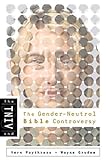 On Sept. 2, the Issues Etc. gang hosted an interview with Vern Poythress of Westminster Seminary-Philadelphia on gender inclusivity in the next translation of the NIV. The MP3 file and more information are available at the Issues Etc. archives. Dr. Poythress is co-author of a book on the gender controversy in the previous update of the NIV.
On Sept. 2, the Issues Etc. gang hosted an interview with Vern Poythress of Westminster Seminary-Philadelphia on gender inclusivity in the next translation of the NIV. The MP3 file and more information are available at the Issues Etc. archives. Dr. Poythress is co-author of a book on the gender controversy in the previous update of the NIV. Dr. Poythress does a great job of spelling out the four possibilities for mapping Greek (or other) original text onto the English
- The original is unambiguously masculine.
- The text is unambiguously masculine, but the point made could apply equally to both sexes
- The text is masculine, but ambiguously so (for example, if “brothers” normally means males but could also be used for a mixture of males and females)
- The original does not have a gender indication, and thus would most accurately be translated as gender neutral
Of course, the issues for hymns are even more daunting, because the meter means that the writer lacks the option of using “brothers and sisters.” Hymnal 1982 certainly mangled most of the high-profile Christmas carols, and showed even less restraint in cramming gender inclusivity into less-known hymns.
This is going to be a huge issue for when (or if) North American Anglicans produce a new hymnal, since the evangelical wing of ACNA (let alone their female clergy) are much more sympathetic to gender inclusivity than the three FiFNA diocese or any of Schism I.
No comments:
Post a Comment